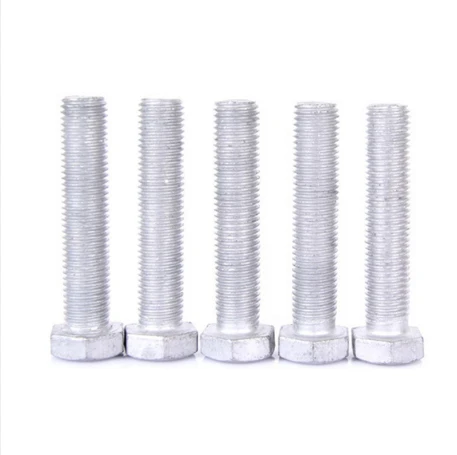

type 3 structural bolts
Oct . 11, 2024 07:29 Back to list
type 3 structural bolts
Understanding Type 3 Structural Bolts Specifications and Applications
Structural bolts play a crucial role in the integrity and stability of a wide range of construction projects. Among the various types of structural bolts, Type 3 structural bolts are particularly noteworthy for their unique properties and applications. This article delves into the specifications, applications, and benefits of Type 3 structural bolts, providing a comprehensive overview for engineers, architects, and builders.
What Are Type 3 Structural Bolts?
Type 3 structural bolts are a category of high-strength bolts designed for use in structural applications. They are typically used in conjunction with structural steel to form robust connections that can withstand significant loads and stresses. The defining characteristic of Type 3 bolts is their ability to resist corrosion, making them suitable for exterior applications and environments where exposure to moisture and chemicals is a concern.
Type 3 bolts are often made from materials that are treated to enhance their corrosion resistance. This makes them an ideal choice for marine applications, bridges, and other infrastructures exposed to harsh environmental conditions. Moreover, they are manufactured according to stringent standards established by organizations such as the American Institute of Steel Construction (AISC) and ASTM International, ensuring their quality and reliability.
Specifications of Type 3 Structural Bolts
To appropriately apply Type 3 structural bolts in construction projects, it is essential to understand their specifications. These bolts are typically categorized by their size, grade, and coating type.
1. Size and Dimensions Type 3 structural bolts come in various sizes, allowing for flexibility in design. The diameter of the bolts can range from ½ inch to 2 inches, with lengths varying accordingly to accommodate different applications.
2. Grades The most common grades for Type 3 structural bolts are ASTM A325 and ASTM A490. A325 bolts are suitable for most medium-strength applications, while A490 bolts are intended for higher strength requirements.
3. Coatings To enhance their corrosion resistance, Type 3 structural bolts can be coated with different materials. Common coatings include hot-dip galvanizing and mechanical plating, which help protect the bolts from environmental damage.
4. Proof Load and Tension Type 3 structural bolts are tested for proof load and tension to ensure they can handle the required loads without failure. For instance, a common A325 Type 3 bolt has a proof load of 20,000 pounds for a ¾-inch diameter.
Applications of Type 3 Structural Bolts
Type 3 structural bolts are widely used across various sectors in construction and engineering due to their strength and durability. Some key applications include
type 3 structural bolts

1. Bridge Construction Bridges require robust connections that can withstand dynamic loads from traffic, wind, and natural forces. Type 3 bolts, with their corrosion-resistant properties, are ideal for use in bridge steel assemblies.
2. High-Rise Buildings In tall structures, every connection must be secure to ensure overall stability. Type 3 structural bolts are used in steel connections to provide the strength required for multi-story construction.
3. Industrial Facilities Factories and warehouses often have specific design requirements to support heavy machinery and goods. Type 3 bolts are commonly employed in these settings to create stable frameworks.
4. Marine and Coastal Applications Structures located in marine environments face unique challenges due to exposure to saltwater, which can accelerate corrosion. The corrosion-resistant capabilities of Type 3 structural bolts make them an ideal choice for such applications.
Benefits of Using Type 3 Structural Bolts
The use of Type 3 structural bolts offers several benefits
- Durability Designed to withstand harsh environments, Type 3 bolts ensure longevity in construction.
- Safety Their high strength and reliability contribute to safer structures, minimizing the risk of failure or accidents.
- Versatility The range of sizes and grades allows for versatility in various construction projects.
- Cost-Effectiveness Investing in high-quality Type 3 structural bolts can reduce long-term maintenance and replacement costs.
Conclusion
Type 3 structural bolts are vital components in the realm of construction, particularly for projects requiring enhanced strength and corrosion resistance. Understanding their specifications and applications not only aids in effective design but also contributes to the safety and longevity of structural investments. As construction practices continue to evolve, the importance of quality hardware like Type 3 structural bolts will remain paramount in delivering safe and sustainable infrastructure.
Latest news
-
High-Strength Hot Dip Galvanized Bolts - Hebei Longze | Corrosion Resistance, Customization
NewsJul.30,2025
-
Hot Dip Galvanized Bolts-Hebei Longze|Corrosion Resistance&High Strength
NewsJul.30,2025
-
High-Strength Hot-Dip Galvanized Bolts-Hebei Longze|Corrosion Resistance&High Strength
NewsJul.30,2025
-
Hot Dip Galvanized Bolts-Hebei Longze|Corrosion Resistance&High Strength
NewsJul.30,2025
-
Hot Dip Galvanized Bolts - Hebei Longze | Corrosion Resistance, High Strength
NewsJul.30,2025
-
High-Strength Hot Dip Galvanized Bolts-Hebei Longze|Corrosion Resistance, Grade 8.8
NewsJul.30,2025

